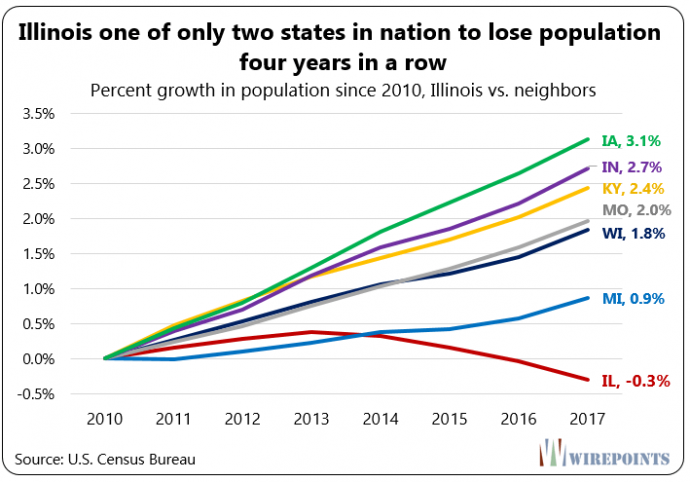Here are Ted Dabrowski and John Klingner indicting Rauner for his failures:
Rauner’s failed record: The best case for a reform agenda in Illinois
Introduction
Gov. Bruce Rauner’s leadership failures have deflated the political pressure for spending and economic reforms in Illinois.
For three years, he couldn’t convince the legislature to pursue his reform agenda. He made things worse when he abandoned those reforms over time. Contradictions and outright falsehoods also damaged his credibility. As a result, the end of the two-year budget impasse left Illinoisans with no reforms and a 32 percent income tax hike. Now, in his latest budget address, Rauner has willingly embraced the tax hike he opposed just months ago. Gone is the reformer who would turn around Illinois.
But while Rauner deserves his share of the blame for Illinois’ disastrous results – record outmigration, a shrinking population and a near-junk credit rating – the reform policies he initially espoused can’t be blamed. They were never implemented. They were blocked at every turn.
Instead, Illinois continued – and continues – to be run by the same failed status-quo policies that have wrecked Illinois for nearly three decades. The same fake budget process. The same punishing workers’ comp laws. The same restrictive labor laws. Growing pension promises. More borrowing. And ever-increasing property and income tax burdens.
Yes, Rauner contributed to Illinois’ mess. But his inability to change anything, ironically, only strengthens the case for structural reforms. The longer Illinois’ status quo policies remain in place, the more this state will continue to decline.
Rauner’s three years
Every statistic that could have gone against Rauner during his term did. The state’s working-class job base shrank, even as every one of Illinois’ neighbors added tens of thousands of manufacturing jobs.
The state’s pension shortfall rose by $25 billion and hit an all-time high of $130 billion. Unpaid bills spiked to a record $16 billion, up from just $6.6 billion when he took office.
Read more: Wirepoints

